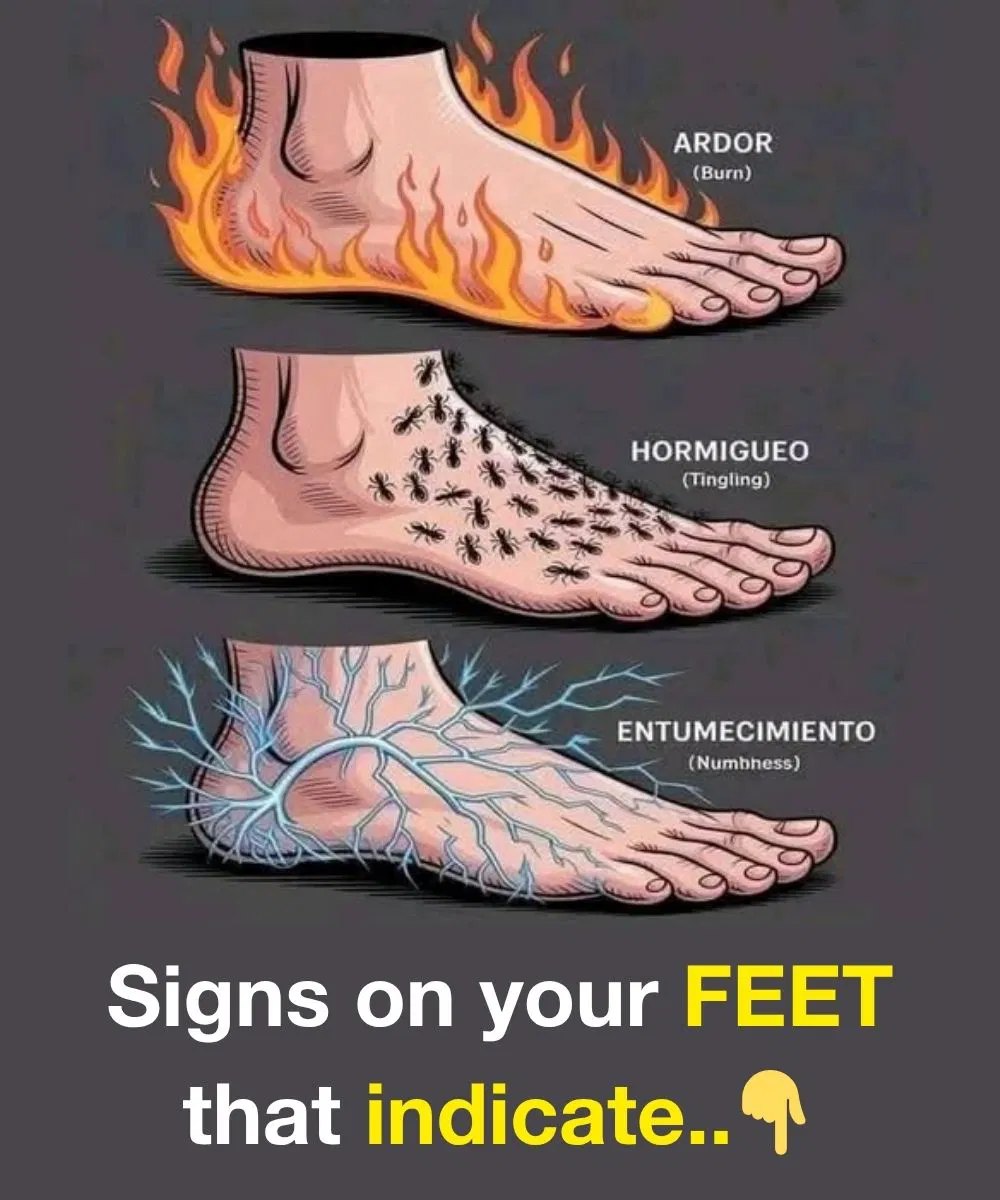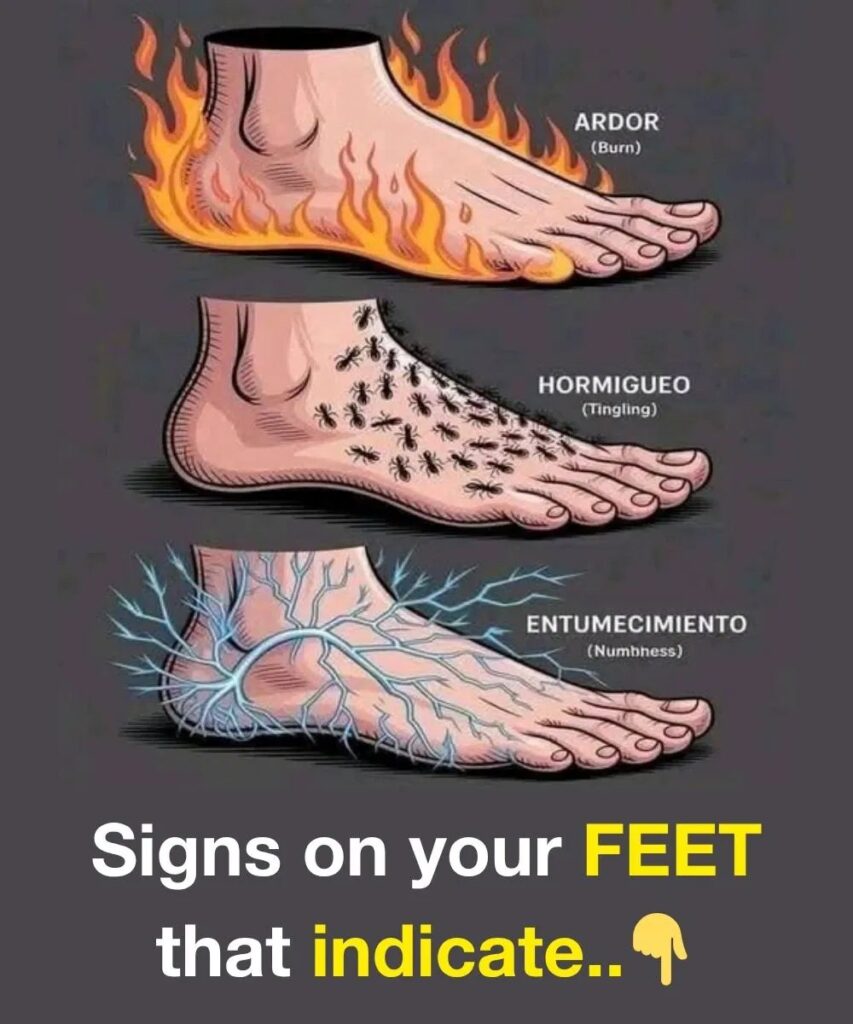Imagine a subtle whisper from your body, a gentle nudge that something isn’t quite right. Often, that whisper comes from our feet – those incredible, hardworking anchors that carry us through life. Have you ever felt that unsettling sensation of your feet burning as if on fire, or a peculiar crawling feeling like tiny ants scurrying beneath your skin, or even an unnerving numbness that makes them feel disconnected?
While these sensations might seem like minor annoyances, easily dismissed or attributed to tired feet, they are, in fact, powerful early warning signals. Our feet are remarkable barometers of our overall health, often being the first to reveal the subtle signs of nerve damage, poor circulation, or even deeper underlying health issues. Ignoring these signals is like ignoring a flickering “check engine” light in your car – it might run for a while, but you’re risking a breakdown down the road.
Your Feet: A Window to Your Well-being
It’s time to truly listen to your body, starting from the ground up. Unusual sensations like burning, tingling, or numbness should never be brushed aside. While they might appear sporadically at first, if they become persistent, more intense, or start interfering with your daily life, it’s a clear call to action. These seemingly innocent feelings could be pointing to conditions like:
- Peripheral Neuropathy: Damage to the nerves outside the brain and spinal cord.
- Diabetes: A common culprit, as high blood sugar can damage nerves.
- Vitamin Deficiencies: Particularly B vitamins, crucial for nerve health.
- Circulatory Conditions: Impaired blood flow preventing vital nutrients from reaching your feet.

Early detection and proactive steps can make an immense difference, potentially preventing serious complications down the line. Let’s dive deeper into the three most common symptoms your feet might be broadcasting:
1. The Blazing Truth: Burning Feet (Ardor)
A burning sensation in your feet, especially one that flares up at night, is a frequent red flag for peripheral neuropathy. This condition occurs when nerves are damaged, and while diabetes is a leading cause, it’s not the only one. Other potential culprits include:
- Excessive alcohol use: Can lead to nerve damage over time.
- Vitamin B12 deficiency: A vital nutrient for nerve function.
- Thyroid issues: An underactive or overactive thyroid can impact nerve health.
- Kidney disease: Can cause toxins to build up, damaging nerves.
- Certain medications: Some drugs can have nerve-damaging side effects.
If this burning sensation is disrupting your sleep or making everyday activities a challenge, it’s crucial to seek medical attention promptly. Early intervention, especially for those with diabetes, can be vital in preventing further nerve deterioration and preserving your quality of life.
2. The Unsettling Crawl: Tingling Feet (Hormigueo)
We’ve all experienced the temporary “pins and needles” sensation after sitting in an awkward position. But when that tingling becomes a regular, unwelcome visitor, or feels like a persistent “ants crawling” sensation, it’s time to pay attention. This consistent tingling can be a signal of deeper concerns, such as:
- Compressed nerves: Often due to conditions like sciatica or disc problems in the spine.
- Vitamin imbalances: Especially deficiencies in B vitamins.
- Early signs of neuropathy: As nerve damage progresses.
- Rarely, Multiple Sclerosis (MS): Though less common, persistent tingling can be a symptom.
If the tingling spreads, intensifies, or becomes more frequent, don’t hesitate to consult a healthcare professional. Catching any nerve issues early on can significantly impact your treatment options and long-term well-being.
3. The Dangerous Disconnect: Numbness (Entumecimiento)
Numbness in your feet or toes is arguably the most concerning of these symptoms. It signifies a reduced or complete loss of sensation, creating a perilous situation where injuries, cuts, or sores can go unnoticed and worsen significantly over time, leading to serious infections or even amputations.
Like burning and tingling, numbness is frequently linked to peripheral neuropathy or poor blood flow. In more severe, though less common instances, sudden numbness accompanied by other symptoms could be a critical indicator of:
Stroke: A sudden blockage or bleeding in the brain.
Spinal cord problem: Compression or damage to the spinal cord.
If numbness comes on suddenly, particularly if accompanied by muscle weakness, difficulty speaking, or vision changes, seek immediate medical help. These are signs of a medical emergency that require urgent attention.
Taking Proactive Steps to Protect Your Nerve Health
Your feet are your foundation, and protecting their health is paramount to your overall well-being. Here are crucial steps you can take to manage or reduce these concerning foot symptoms:
- Master Your Blood Sugar: If you have diabetes, diligent blood sugar control is your most powerful weapon against nerve damage.
- Nourish from Within: Embrace a diet rich in essential vitamins, particularly B vitamins (B12, B6, B9), and antioxidants. Consider consulting your doctor about high-quality vitamin and mineral supplements if dietary intake isn’t enough.
- Ditch the Vices: Avoid excessive alcohol and tobacco consumption, as both can significantly harm nerve and circulatory health.
- Support Your Soles: Wear supportive, comfortable shoes that fit well and don’t constrict your feet, promoting healthy circulation.
- Regular Foot Checks: Make it a habit to inspect your feet daily for any cuts, sores, or changes in skin color.
- Move Your Body: Regular physical activity promotes healthy blood flow throughout your body, including your feet.
Most importantly, let me repeat: persistent symptoms should never be ignored. Your feet are intelligent messengers, and their signals are not to be taken lightly. Early detection and proactive intervention can make a world of difference in protecting your overall health, preventing complications, and ensuring you continue to walk through life with comfort and confidence.


